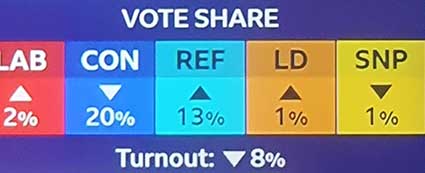Let me start with today’s UK headlines as sampled from, respectively, tabloid, middlebrow and elite organs. As expected, and as noted the day before yesterday:
Britain [has] with little enthusiasm – and in very much lower numbers, proportionally speaking, than those which in March re-elected Mr Putin in Russia – put its five-year collective pencil to the tick-box of illusory choice in such a way as to eject TweedleTory from office, and usher in TweedleTorylite …
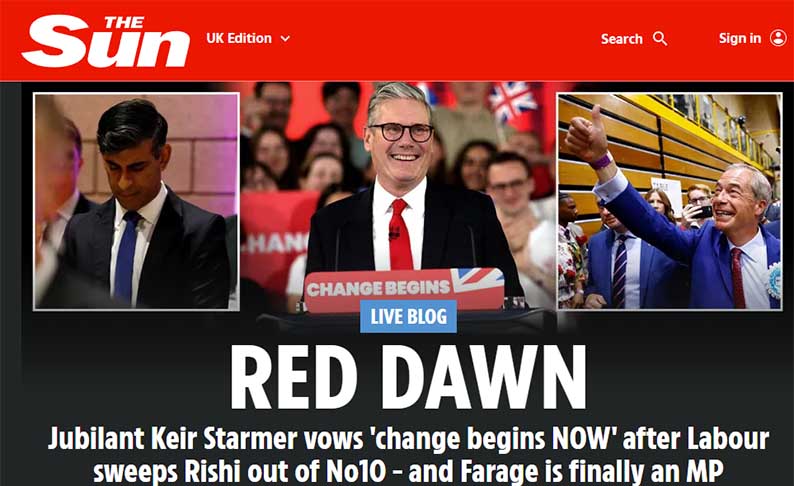
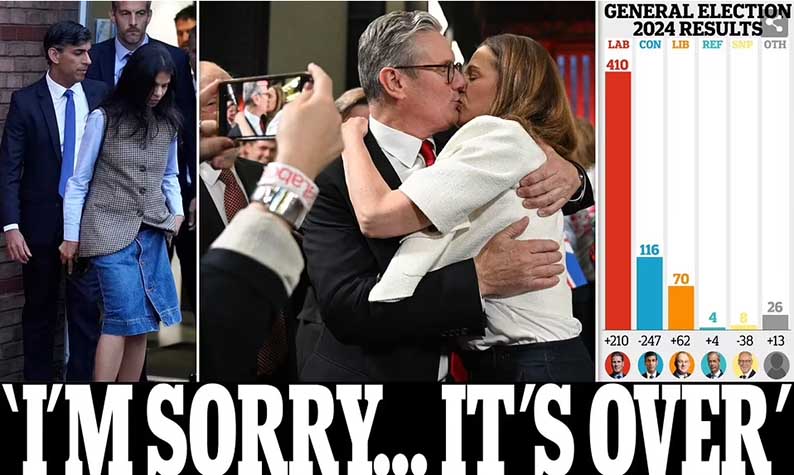
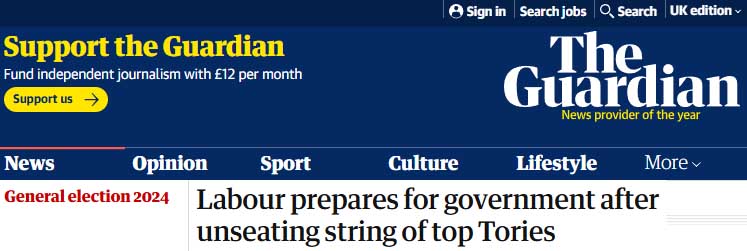
The Guardian quotes Labour’s national campaign coordinator, Pat McFadden, who credits Keir Starmer’s “transformation of the Labour party” with taking it from its worst defeat since 1935 to its best result since Tony Blair’s 1997 landslide. 1
We have campaigned as a changed Labour party, ready to change Britain. It is remarkable that Labour was in a competitive position in this election given what happened in 2019. Whatever has been claimed throughout the campaign, the Labour party has assumed nothing about the result and has worked tirelessly to bring our message of change to people across the country.
There’s no mistaking the establishment-friendly narrative informing such an assessment. That story begins, once we’re all sitting comfortably, with a loony left somehow managing in 2015 to capture the leadership …
Disillusioned by a lack of a left-wing voice in the 2015 leadership contest, Corbyn stood on an anti-austerity platform. Of the candidates who stood, Corbyn received the fewest parliamentary nominations. Many who nominated him said they had done so not to support his candidacy, but to widen the debate by including a socialist voice. However, Corbyn soon became the frontrunner and was elected with a landslide of 59%.
But bear with me as I offer an account less fanciful, by way of a whistlestop tour from that day to this. Do please keep in mind that the wider context as set out in many a steel city post – this for instance – is of a UK ruled by rentiers, its manufacturing base destroyed for the short term gain of the same, in which the neoliberal interests Starmer no less than Sunak stands for are under threat as the waning of 500 years of western ascendance continues apace. 2
Everyone onboard with that? Great. Here goes.
Following Corbyn’s 2015 victory, with no one more surprised than he, Labour adopted what in Wilson’s, Callaghan’s and even Thatcher’s day would have been a mildly socialist programme, but with Neoliberalism the only game in town could be reviled as Marxism on steroids – a stark contrast to the sensible policies of Tony Blair. 3
Labour Party membership didn’t just surge. Between May 2015 (190,000) and July 2016 (515,000) it damn near tripled. After decades in which no serious challenge to what Tariq Ali has dubbed the Extreme Centre seemed possible – and in which widespread cynicism could consequently and with impunity be read as consent for ‘austerity’ – “Jezza” was packing out venues booked for his public addresses, obliging event organisers to hastily erect speakers and screens in the streets for the throngs unable to get in.
The Extreme Centre was shaken. Something Had To Be Done.
All sections of our lovely media stepped obediently forward to do their duty and speak power to truth. And for the benefit of Guardian apologists, 4 I do mean all sections …
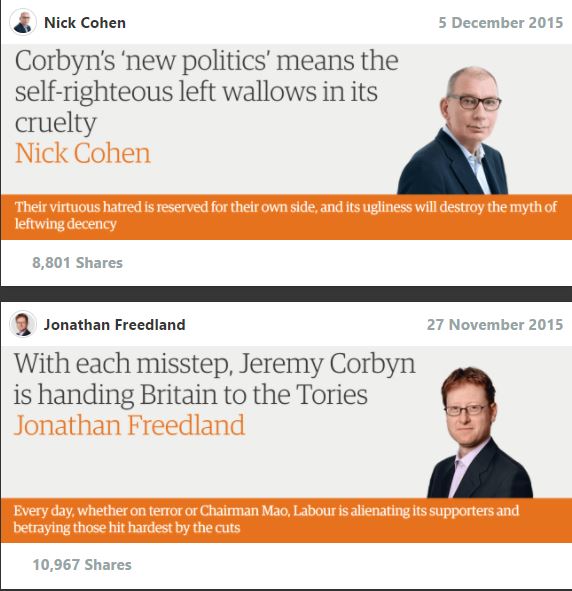
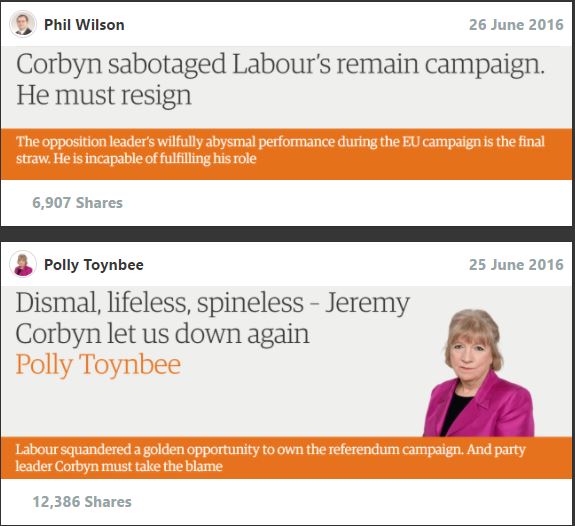
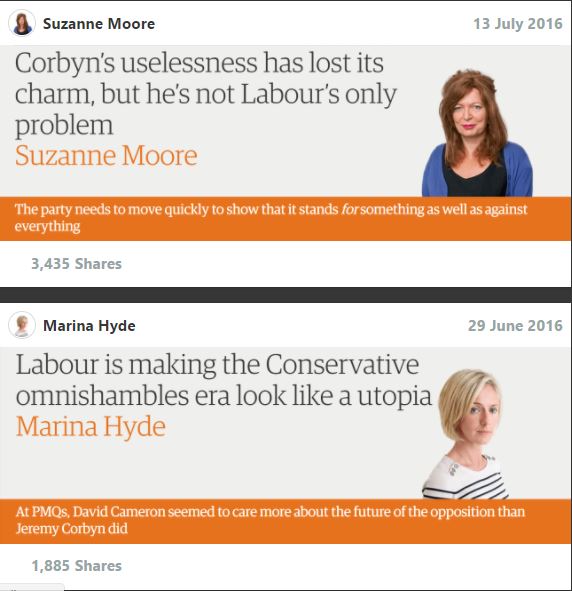
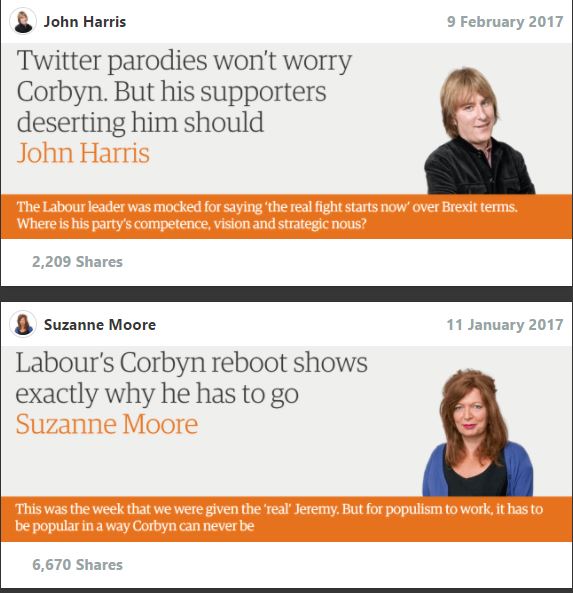

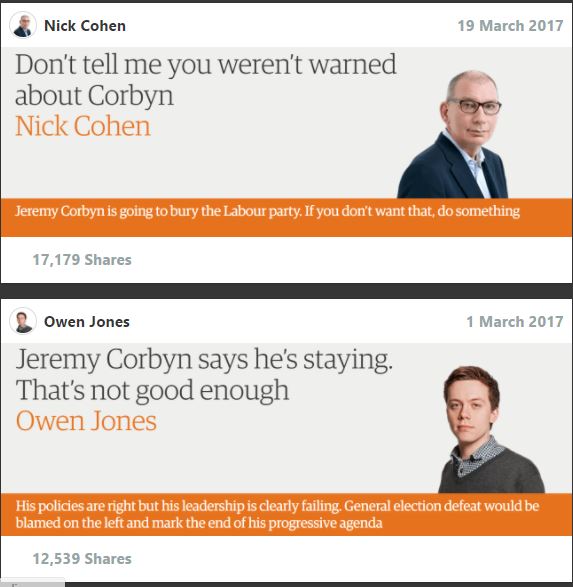
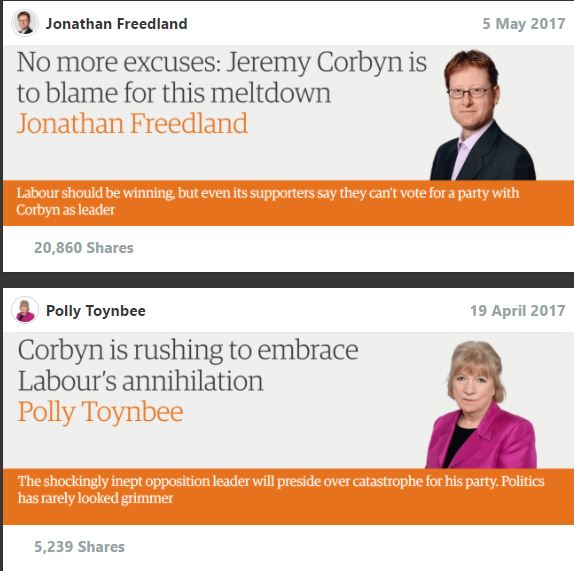
Meltdown? Jonathan Freedland puts a dishonest spin (penultimate screenshot) on the 2017 snap election, called by PM Theresa May, which wiped out the overall majority enjoyed by her party – a party divided over how Brexit should proceed but united in its fury at her gamble – only to turn in a dire personal performance and badly underestimate the man of whom the BBC, in what lawyers call a statement against interest, would say in post mortem:
Many commentators, on the left and right, who had written Jeremy Corbyn off as vote-losing liability have had to eat their words since the election. Just about everyone underestimated his appeal, once he was given a chance to air his views unmediated by a largely hostile press.
Needless to say, his strong showing in the face not only of unprecedentedly vituperative media, but of the Labour Right – with its long history of preferring Tory government over one led by its own Left 5 – did nothing to tone down Guardian hostility.
Which, like that of corporate media at large, finally struck gold – after the failures of IRA-gate, Hamas-gate, Virgin Train-gate and He’s-a-crap-dresser-gate – with an accusation not only despicably and manifestly untrue but a non issue (as party canvassers unanimously fed back from Britain’s doorsteps) for the average voter. I mean of course the Goebbelsian lie, a team effort by Labour Right and Israel Lobby, that Corbyn is antisemitic and/or that antisemitism had soared within the party on his watch. The first is risible, the second lacking, in an omen of things to come, the slightest evidential basis.
Naturally the party grandees too did their bit. As I wrote eight years ago to the month:
Blair confided to the Graun last August that he “does not fully understand the forces stoking Corbynmania” – which says it all but, to be fair, neither does the Graun. Mandelson’s interventions fared no better, ditto those of Jack Straw. Then on Saturday my fellow Sheffielder David Blunkett, who twice had to leave Blair’s cabinet for malfeasance (that’s abuse of office to me and thee), chose the day Corbyn opened his campaign to rail against the man’s “fanatical supporters”. It’s a testament to Blunkett’s zeal on this front that for once he was penning not for the Mail, his organ of preference, but a less munificent Observer.
As a senior general openly mooted – with scant condemnation, far less arrest for High Treason – removing a Corbyn led government by armed force, the ongoing vilification 6 of the Labour leader, in tandem with his undermining from within his own party, sealed his fate. After losing to Boris Johnson in 2019 (a result which inspired a post I repeatedly link to, apropos corporate media’s systemic inability to be truthful on matters vital to power) Jeremy Corbyn resigned the leadership and we are where we are. Something Had Been Done.
Extreme Centre (UK Section) – thy name is Starmer!
We can be sure his government will dutifully prosecute Washington’s war, as disastrous as it is murderous, on Russia in Ukraine to the cost of Britain’s people no less than Europe’s. We know too that it will back Israel’s genocide in Gaza. Structural reasons aside, anything other would show ingratitude for services rendered in bringing down Corbyn.
But what of its direct impact on Britain? Let me end by quoting a man whose views on too many important matters, headed up by Ukraine and Julian Assange, are smugly ill-informed. That said, and despite being an economist, Richard Murphy has a gift for framing the economic illiteracy of both Starmer and his Chancellor in terms of striking simplicity. I’ve cited this passage before, but make no apologies for that. Not on this of all days.
Keir Starmer was interviewed by the ever-affable Justin Webb on the Tory Today programme on BBC Radio 4 this morning. Paul Waugh, chief political correspondent of the Independent, summarised one exchange as follows:
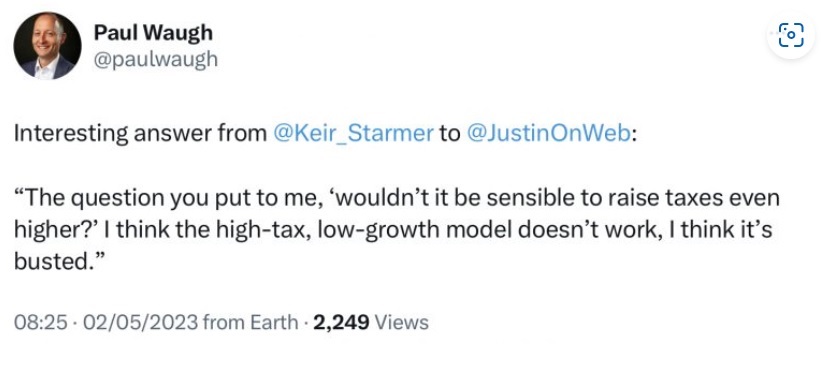
Starmer was actually asked about taxes on wealth. He rejected the idea.
What is Starmer saying as a result? There are at least three obvious things.
The first is that inequality does not matter, when it very clearly does.
The second is that he does not think redistributing wealth, from those who only save their excess income to those who might spend it in the economy, [see footnote 2] can have an impact on the economy as a whole. This reveals a staggering level of incomprehension of the impact of multiplier effects.
Third, he really does not believe in the ability of government to meet need. If he thinks high tax delivers low growth he is clearly saying low tax, which is associated with small government, does deliver growth. In other words, he is suggesting that the private sector is to be preferred as a delivery mechanism to the state.
I could dig deeper but I am not sure I need to. This is neoliberal thinking of the most basic, dogmatic, mantra-driven and unchallenging type. The message could not be clearer. Everything Labour once stood for will not be embraced by him, his team or any government he leads. We will instead get austerity, shrinking services, growing inequality and kow-towing to the markets, bankers, and the supposed entrepreneurs in big business whose sole objective is to gouge out their companies for their own private gain.
I despair.
I can say with a very clear conscience that I will not be voting Labour this week.
Me neither. For form’s sake I gave my tick yesterday to a student at Sheffield University. Call me superficial but at least Caitlin Hardy, of George Galloway’s Workers’ Party, is easy on the eye.

* * *
- This morning and prior to this post a steel city reader emailed: “Huge Labour success? Not really – only 2% increase in their support but large gains by minor parties at the Tories’ expense. Yet all the news channels are hailing it a great Labour victory.”
- Telling here are those handouts to the rich (who hoard wealth, where the rest of us must spend in and so boost the economy) through the Quantitative Easing of 2008. Why else would Barack Obama have reminded those rentiers that he had their backs against the “pitchforks” of the angry plebs?
- Sensible policies such as funding school and hospital building using PFI – its swingeing repayment terms damned these days from the right, the left and even the traditional mouthpieces of that Extreme Centre – but seemingly favoured by new Chancellor of the Exchequer, Rachel Reeves.
- Think Julian Assange!
- Recall Jess Phillips’ unrestrained joy, before the realisation she was on camera forced a hasty rearrangement of her features to register deep dismay, as loss after Labour loss poured in on election night 2019. Recall too how in 1987 – in a breach of party rules both flagrant and unpunished – Birkenhead Labour MP Frank Field called on neighbouring Wallasey not to vote for its Left Labour candidate. And then there were those emails by Labour apparatchiks voicing – in ripe language that leaves Victoria Nuland’s “fuck the EU” in the dust – dismay at the strong showing of ‘Corbynites’ in local elections.
- In the case of liberal media, that vilification centred on his “unelectability” – a judgment both unproven and self-fulfilling.

